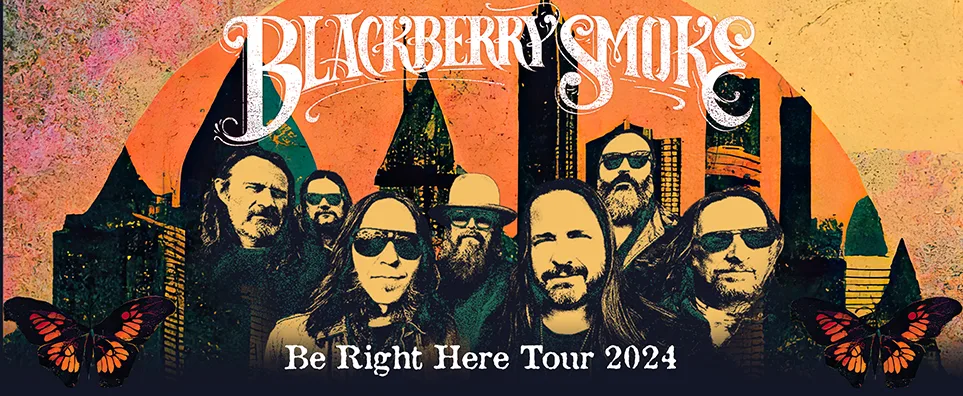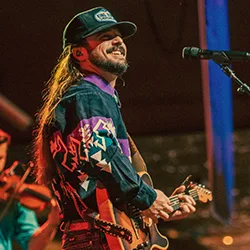

Blackberry Smoke feat. Taylor Hunnicutt
-
DateFeb 07, 2026
-
Event Starts7:30pm
-
Doors Open6:30pm
-
AvailabilityPast Event
-
LocationBlue Gate PAC
760 S Van Buren St
Shipshewana, IN 46565
-
Seating ChartView Seating Chart (If you are paying with a gift card, you must call to purchase tickets 260.768.4725)
Feb 07, 2026
Saturday @ 7:30pm
Event Details
-
Blackberry Smoke VIP Photo Op Experience Package | Package Price - $295.45
What's included:
- Premium Reserved Ticket
- Exclusive Mini Preshow Performance
- Photo Op with Blackberry Smoke
- Access to Brit Turner Memorial Display
- Exclusive Poster Autographed by Blackberry Smoke
- Exclusive VIP Merchandise
- Commemorative VIP Laminate
- On-site VIP host *A portion of the proceeds from this VIP Package will benefit the Brit Turner Family Fund at CURE Childhood Cancer.
-
Blackberry Smoke Merchandise Package | Package Price - $190.45
What's included:
- Premium Reserved Ticket
- Exclusive Poster Autographed by Blackberry Smoke
- Exclusive VIP Merchandise *A portion of the proceeds from this VIP Package will benefit the Brit Turner Family Fund at CURE Childhood Cancer.
VIP instructions for the Preshow Experience will be emailed approximately 48 hours prior to the event. Plan to arrive before Door time. Merchandise items will be collected at the venue during check-in. If you do not receive the email 48 hours prior or have a question related to your VIP package, please email VIP@ONELIVE.COM or call (877) 717-5816. Merchandise subject to change.
**Please note: (This Package does NOT include a Photo Op)**
Merchandise package is shipped the week of the show to the address provided at checkout and may arrive shortly before or after the event date. If you need to update your shipping address, or have a question related to your VIP package, please email VIP@ONELIVE.COM or call (877) 717-5816. Merchandise subject to change.
Over the past two decades, Blackberry Smoke has amassed the following of a loyal fanbase, leading their last six full-length albums to achieve great chart success, including 2021's You Hear Georgia, which reached #1 on Billboard's Americana/Folk Albums chart and 2024's Be Right Here, which reached the top 5 on the Top Current Album Sales chart.
Touring relentlessly, the band know a little something about hitting the road in order to find a place to belong, and supported by the strong fanbase of Brothers and Sisters, legions of whom travel across the globe to support the band, they in turn give fans a palace to belong.
Over the years the band has appeared across the globe on stages such as Austin City Limits, Bonnaroo, Summerfest, Glastonbury, Download UK, to name a few, and has no plans to stop anytime soon.
For Blackberry Smoke, embracing the light and finding the silver lining are once again at the heart of what they do best.
Plan Your Visit:▼
Parking: Free parking is available at the venue. Please have patience and be respectful when leaving our parking lots after the show.
Ticket Office: For ticket sales and assistance with ticket orders, please visit our box office or call 260-768-4725. Box Office hours are Monday thru Saturday, 10am to 7pm. All ticket sales are final and non-refundable, no exception.
Tickets: Your phone is your ticket. Make sure you have downloaded your ticket before arriving at the venue to present at ticket check. Will Call tickets can be picked up at the box office window, and you must present a photo ID. If you need your tickets printed for any reason, visit the venue box office prior to entering ticket check. Tickets that include a dining package will need to be printed prior to visiting the restaurant since they serve as your dining voucher.
Rain or Shine Events: All events are rain or shine. In the event of hazardous weather during an event, please follow the safety directions given by venue staff and displayed on digital screens.
Bag Policy: For safety and efficiency, we recommend entering without a purse or bag at our venues. If essential items are needed, we encourage guests to bring them in a small, clear purse. All non-clear purses will be searched, and this will be enforced upon entry at our Performing Arts Center. Diaper Bags for families with small children and bags with required medical items are permitted. No oversized purses, tote or duffel bags, or backpacks of any type will be allowed.
Prohibited Items: Please review the prohibited items list before you come to an event. This list can be found on our FAQ page.
Concessions: Refreshments are available for purchase within the venue. No outside food, candy, or beverages are allowed.
Bar Service: We do have beer and wine service available at most of our PAC concerts. Hours of service vary, depending on show schedule, but the bar is typically open for at least 90 minutes once doors are open.
No Smoking: Smoking and vaping are strictly prohibited inside the venue.
Safety and Security Policies: All members of your party must have a ticket to enter the venue. All individuals entering the facility are required to go through a security screening which includes metal detection and checking bags for prohibited items. These security screenings may vary on some events, so please refer to your "Know Before You Go" email to plan your visit accordingly. Re-entry is not permitted without a ticket. For a complete list of prohibited items and venue policies, visit our FAQ page.
Accessibility: For complete information on our services, please visit the Accessibility section of our FAQ page.
Dining Packages: Buffet dining at our Blue Gate Restaurant can be added to any ticket price for your convenience. Price would include meal but not gratuity. To ensure guests have time to dine, we suggest arriving no later than 2 hours prior to show time, in case the restaurant is on a wait.
Hotel Reservations: If you need hotel accommodations, consider staying at our Blue Gate Garden Inn – adjacent to the Performing Arts Center! For more information and to check availability, visit https://www.bluegategardeninn.com/ or call 260.768.4725.
For more information, simply visit our FAQ page.
Ticket Office: For ticket sales and assistance with ticket orders, please visit our box office or call 260-768-4725. Box Office hours are Monday thru Saturday, 10am to 7pm. All ticket sales are final and non-refundable, no exception.
Tickets: Your phone is your ticket. Make sure you have downloaded your ticket before arriving at the venue to present at ticket check. Will Call tickets can be picked up at the box office window, and you must present a photo ID. If you need your tickets printed for any reason, visit the venue box office prior to entering ticket check. Tickets that include a dining package will need to be printed prior to visiting the restaurant since they serve as your dining voucher.
Rain or Shine Events: All events are rain or shine. In the event of hazardous weather during an event, please follow the safety directions given by venue staff and displayed on digital screens.
Bag Policy: For safety and efficiency, we recommend entering without a purse or bag at our venues. If essential items are needed, we encourage guests to bring them in a small, clear purse. All non-clear purses will be searched, and this will be enforced upon entry at our Performing Arts Center. Diaper Bags for families with small children and bags with required medical items are permitted. No oversized purses, tote or duffel bags, or backpacks of any type will be allowed.
Prohibited Items: Please review the prohibited items list before you come to an event. This list can be found on our FAQ page.
Concessions: Refreshments are available for purchase within the venue. No outside food, candy, or beverages are allowed.
Bar Service: We do have beer and wine service available at most of our PAC concerts. Hours of service vary, depending on show schedule, but the bar is typically open for at least 90 minutes once doors are open.
No Smoking: Smoking and vaping are strictly prohibited inside the venue.
Safety and Security Policies: All members of your party must have a ticket to enter the venue. All individuals entering the facility are required to go through a security screening which includes metal detection and checking bags for prohibited items. These security screenings may vary on some events, so please refer to your "Know Before You Go" email to plan your visit accordingly. Re-entry is not permitted without a ticket. For a complete list of prohibited items and venue policies, visit our FAQ page.
Accessibility: For complete information on our services, please visit the Accessibility section of our FAQ page.
Dining Packages: Buffet dining at our Blue Gate Restaurant can be added to any ticket price for your convenience. Price would include meal but not gratuity. To ensure guests have time to dine, we suggest arriving no later than 2 hours prior to show time, in case the restaurant is on a wait.
Hotel Reservations: If you need hotel accommodations, consider staying at our Blue Gate Garden Inn – adjacent to the Performing Arts Center! For more information and to check availability, visit https://www.bluegategardeninn.com/ or call 260.768.4725.
For more information, simply visit our FAQ page.
More Shows You'll Like:







